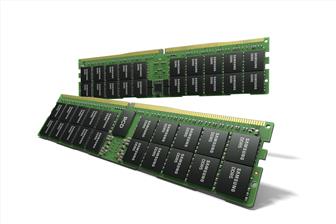
AUO's 6-inch full HD LTPS in-cell touch panel integrates the display driver IC and touch IC to simplify the overall module structure, according to the company. Moreover, a new circuit and display design have enabled the bottom module border to decrease by 40% in width, and the left and right module borders to be just 0.6mm wide, achieving ultra-slim border on all four sides.
The 18:9 full screen aspect ratio produces more space to accommodate a virtual HOME button. Moreover, the in-cell touch technology allows for higher touch sensitivity and precision, and the smartphone could become slimmer and lighter. The panel possesses 1080 x 2160 high resolution and employs AHVA (advanced hyper-viewing angle) technology.
The panel will be showcased at Touch Taiwan 2017 in Taipei September 20-22.

Samsung HKMG DDR5
Samsung Electronics has expanded its DDR5 DRAM memory portfolio with a 512GB DDR5 module...
Photo: Company

Nvidia GeForce RTX 30 series GPUs
Nvidia's GeForce RTX 30 series GPUs are powered by the company's Ampere architecture. The...
Photo: Company

Apple HomePod mini
Apple's HomePod mini is the newest addition to the HomePod family. At just 3.3 inches tall,...
Photo: Company

Apple 13-inch MacBook Pro with Magic Keyboard
Apple has updated the 13-inch MacBook Pro with the new Magic Keyboard for an improved typing...
Photo: Company

Apple iPad Pros
Apple's new iPad Pros comes with the latest A12Z Bionic chip, an ultra-wide camera, studio-quality...
Photo: Company
- Huawei's latest AI processors were made by TSMC (Oct 22) - Bloomberg
- Arm to scrap Qualcomm chip design license in feud escalation (Oct 23) - Bloomberg
- Embedded World brings 3,500 visitors to 1st US outing (Oct 11) - EE Times
- Preparing electronics engineering students for industry (Oct 8) - EETimes Europe
- Former Apple hardware chief Dan Riccio is retiring (Oct 11) - Ars Technica
- Key takeaways as China outlines plans to revive economy, end housing slump (Oct 11) - Bloomberg
- Taiwan's president vows to resist 'annexation' (Oct 10) - BBC News
- Indonesia asks Apple, Google to block China's Temu to protect small merchants (Oct 11) - Reuters
![]() Microsoft's custom chip sets new industry benchmark while deepening AI partnerships across sectors
Microsoft's custom chip sets new industry benchmark while deepening AI partnerships across sectorsAs Microsoft transitions from a software giant to a cloud leader, with its cloud business now accounting...
![]() Global supply chain: Mobile, telecom, computing
Global supply chain: Mobile, telecom, computingMobile, telecom, computing trends

CSP in-house development of ASIC accelerators
Google TPUs will see a share of over 70% in the in-house developed cloud ASIC accelerator market in 2024; an all-optical network...

AI chip market outlook 2023-2028: Insights from demand and supply perspectives
The growing demand for AI computational power is accelerating advancements in hardware and chip technology, necessitating innovation...

Automotive CIS tech development, 2024
The popularization of autonomous driving is boosting demand for automotive CIS with LFM and HDR being mainstream development...






